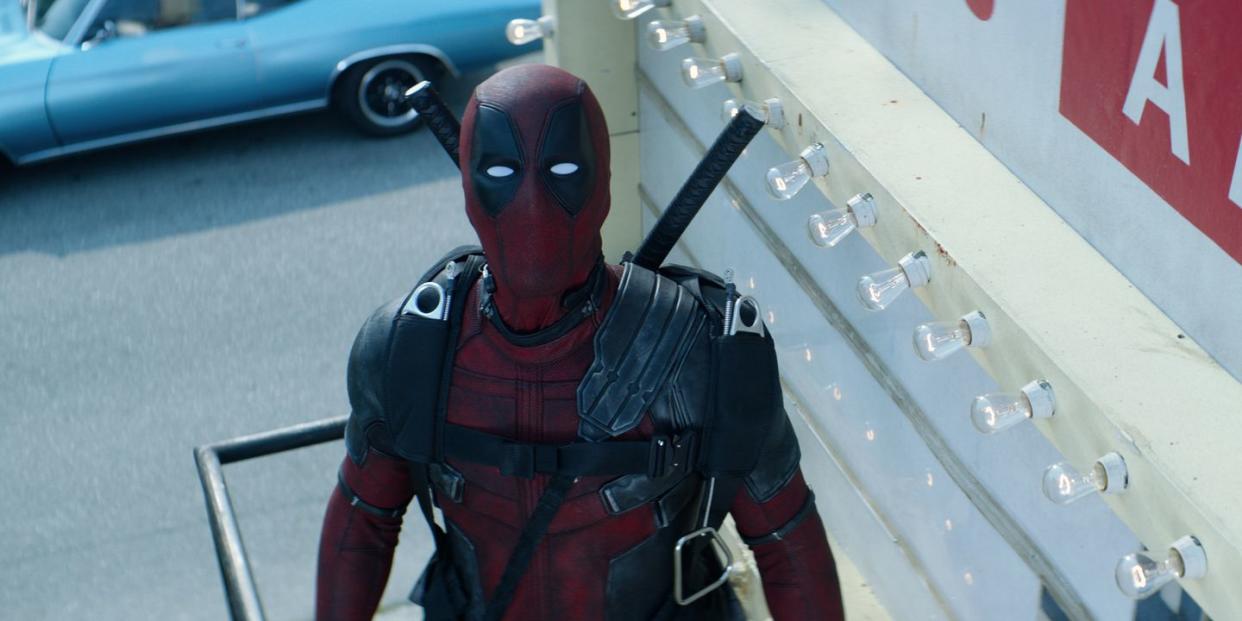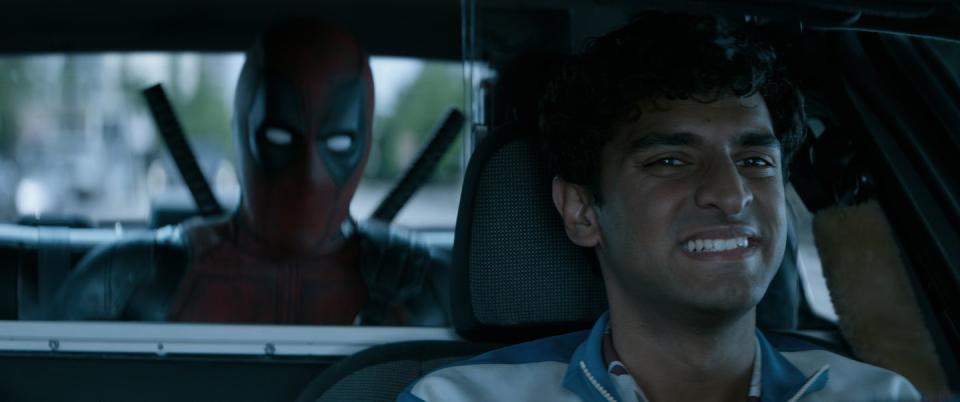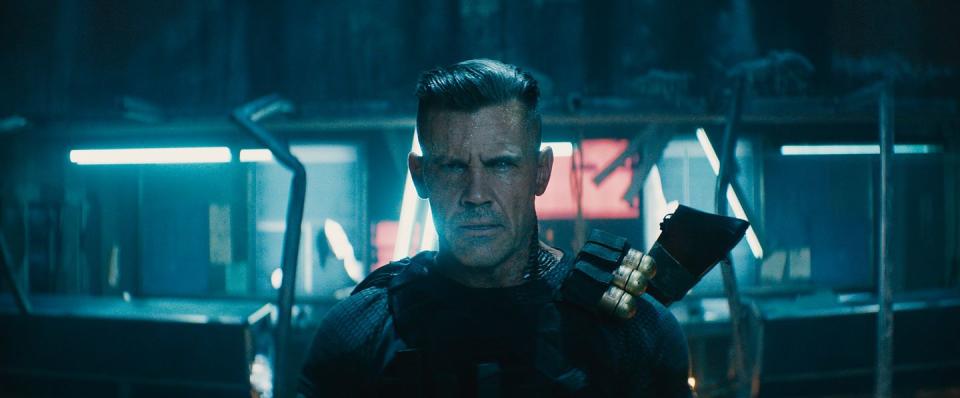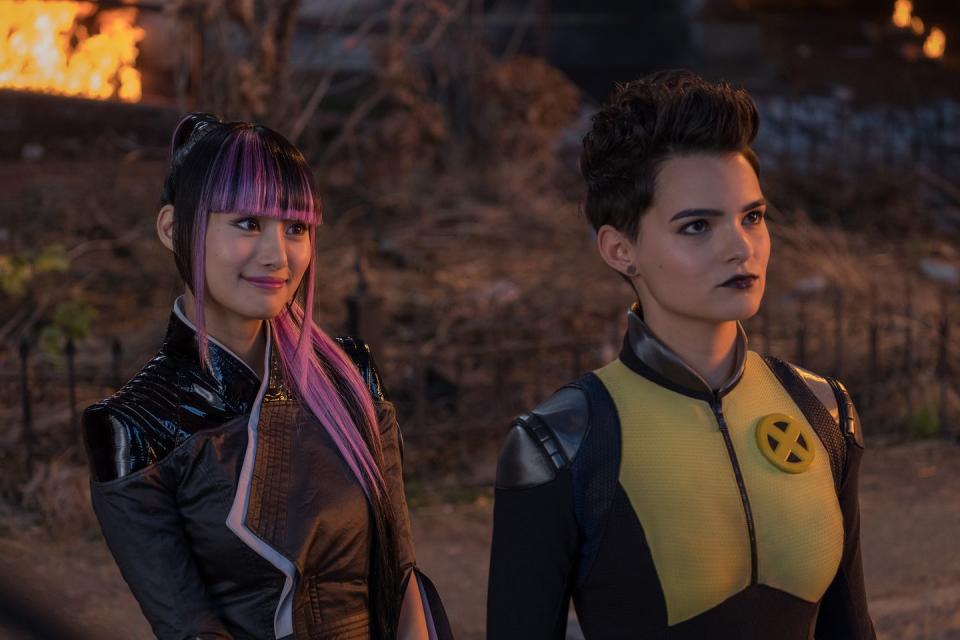The 'Deadpool 2' Writers Are the Real Heroes

A thug on a motorcycle gets a wedgie. A man’s face is smashed into a crotch. But the funniest aspect in Deadpool 2’s bullet-time opening sequence might be the credit for the writers: “The Real Heroes Here.”
When Paul Wernick and Rhett Reese received a Writers Guild Award nomination for Best Adapted Screenplay in 2017, critics did a collective spit-take. (Past winners include the writers of Brokeback Mountain and Schindler’s List.) But look beyond the pull-my-finger humor; Deadpool was a thinking-man’s superhero movie with fourth-wall breaks, deep cultural references, and the nonlinear structure of an art-house film. It became the second-highest-grossing R-rated movie of all time and garnered a Golden Globe nod for Best Picture (Musical or Comedy), helping to usher in the era of smart, no-holds-barred comic adaptations like Logan and funny curveballs like Thor: Ragnarok.
The sequel aims to do more genre-busting. “If Paul and I have a brand, it’s the ability to look at a genre and make fun of it and be it at the same time,” says Reese. Before making mutants fart, they took the piss out of horror movies with Zombieland and reality TV with The Joe Schmo Show.
Ryan Reynolds, who stars as the Merc with a Mouth, personally paid for the writers to be on set for the first movie when the studio wouldn’t pony up. (The suits did so for Deadpool 2.) He so embodies the character’s boyish wit that he became part of the sequel’s writing team. And because Deadpool wears a mask, zingers can be added well into postproduction, as in an animated film. What has the trio’s scripting relationship been like?
“I can’t get my Davis Love III joke in there, and it’s killing me,” says Reese, referring to the pro golfer. “It’s gold, and yet Ryan Reynolds will not allow it.”
“The Deadpool team is going to break up over Davis Love III,” says Wernick.
We talked to Paul and Rhett more about the sequel, working with Ryan Reynolds and making the audience Google punchlines.

ESQ: The first Deadpool was ultimately a love story. Is there an underlying genre to the sequel?
Paul Wernick: Deadpool 2 is a family film. That’s how we’re positioning it. Fox is about to get bought by Disney, Disney’s a very family friendly company, and Deadpool 2 is a very family-friendly film.
Rhett Reese: A dysfunctional family film.
And an R-rated family film.
PW: I’m not suggesting that anyone bring their kids to this movie, I’m just saying it is a family film. [Laughs.]
RR: It is literally a film about family.
I know you guys were on set for the first Deadpool. You were on set for the sequel, and is it common for writers to be on set?
RR: Some directors are threatened by having writers on their set, or don’t find it necessary. Some studios aren’t willing to pay for it, and some stars kind of couldn’t care less. In this case we just happened to be in this triumvirate situation where our director’s very receptive to us being there, we wrote the script with Ryan so he wanted us there, and the studio was happy to pay us to be there. But that’s reasonably uncommon when all the stars align like that.
PW: Deadpool is such a living breathing screenplay in the sense that things are always changing. Because Deadpool’s in a mask, we can write lines for him and can put words into his mouth up until basically the movie launches much like an animated film. We are always game to add a a joke, and being on set really helps the process.

The budget for Deadpool 2 is much bigger than the original. Was it difficult to scale up to that?
RR: A lot of writers will joke around and say, “Necessity was the mother of invention. It’s better to have a lower budget cause it forces you to make choices.” I think that tends to be a little bit of after-the-fact rationalization. Of course we were happy to have a bigger budget.
I mean, there were certainly moments in the first movie, that probably benefited from having a smaller budget. For instance Deadpool forgetting his guns in Act 3 was a consequence of us not having the money to shoot a big gun fight in Act 3. And so we tried to look at it from a character perspective and I think we found a pretty funny moment where Deadpool forgets his duffel bag in Dopinder’s cab.
But no, we were thirsty for every penny on this one because we had some new characters to introduce. Fox ponied up some new money-I think the the box office grosses of the first movie justified it-and I think it will show.
I think what you have to do is resist the temptation to provide spectacle for spectacle’s sake and lose the intimacy and emotion behind your story. That’s what we didn’t want to do. And we also didn’t want to spend a lot of time setting up future movies, like a lot of times you’re introducing characters for the sole purpose to set up the franchise that’s coming. We wanted to make sure everyone in this movie was there for a reason and bounced off Deadpool’s goals either as foils or as allies for our story.

Deadpool’s kind of the master of that brand of “pull my finger” comedy. How do you know the line between a great joke and maybe one that’s just too juvenile?
PW: I mean, we’re always keeping, you know, a “pull my finger” in the air. We are definitely aware that we don’t want to get too puerile because we’re better than that. But sometimes we’re not better than that. We never wanted to forget our audience. Deadpool’s a kid at heart. He’s this little juvenile kid trapped in a man’s body in a superhero suit, so we never wanted to lose that.
When you’re writing those jokes do you have a particular person or a group in mind?
RR: You hear a lot of people say this, but ultimately we’re just trying to make each other laugh. Because we figure if we make each other laugh, we’ll probably end up making others laugh. Because we have a quantity of jokes in the script we don’t need to please everybody with every joke. So, we will write a joke sometimes that only young people would get, we write a joke sometimes that only older people would get, or we write a joke that only comic nerds would get. There are definitely jokes where you get a very small subsection of the audience laughing hard and nobody else in the audience doing anything, but that’s okay for us. We don’t mind that.
PW: We had a Ronnie Milsap joke in there in the first movie. There are a couple people in the theater who laugh at that. There are a bunch in the theater who don’t have any idea who Ronnie Milsap is and then who will ultimately go back and look it up on the internet when they get home.
RR: We’re in our 40s, so we sometimes write jokes that are dated, you know? With comedy, as long as you’re nailing enough along the way, you’re okay. And sometimes young people also appreciate jokes that they have to dig into and find out why they’re funny after the fact. So it tends to work out.
PW: I mean, marketing built a whole campaign around Bob Ross, who’s a 1970s PBS artist. Do 14 year olds know who Bob Ross is? No, but did everyone kind of embrace it and think holy Christ this is weird and Deadpool and funny and only something that we could do? Absolutely.
RR: We do ask ourselves what can we do by virtue of being a Deadpool movie that others can’t? And we do those things. Because nobody else has the license to do it and we should take full advantage of that.

What is your creative relationship like with Ryan?
PW: He’s brilliant. We’ve been working with him lock and step for nine years now and he is a fountain of ideas. Our joke is that, on set, he does everything better than anyone who is assigned a particular task. And he is this character in the sense that his voice-Deadpool’s voice-just lives in his head.
Rhett and I have known each other since high school. We grew up in Phoenix, Arizona, together. And so, we’ve known each other 30-plus years. It’s always hard to bring someone into our world just because we have a shorthand. And Ryan has fit in so seamlessly and made us all better writers and comedians and filmmakers.
RR: There was a moment we were over in Ryan’s hotel suite writing this movie and he had to step out to take a meeting and when he did, we ran into the bathroom and put on bathrobes and got into his bed. And so, when he came back we were both in his bed and our bathrobes working on our laptops. He was cracking up. We sort of feel like a Deadpool-style twist dysfunctional family. There’s a certain playfulness when we’re all together that I think bleeds over into the movie.

Will you be disappointed if Deadpool 2 doesn’t get a Writer’s Guild of America nomination?
PW: We’ll be disappointed if Deadpool 2 doesn’t get an Oscar nomination. No, I’m kidding. You know, I think it was just kind of the perfect storm of time and place. The industry’s evolved now. And who knows. We don’t write Deadpool as our prestige play. Last time was just kind of a big surprise. But it’s surely not why we write it. If it gets honored in fun ways, as long as it’s not a Razzie, we’re good.
What’s the origin of the "real heroes here" line in the credits of the first movie?
RR: That credit sequence went through a lot of iterations. And, ultimately, it kind of came down to people writing their own credits. So, you know, Miller wrote his credit. Ryan wrote his credit, which was “God’s perfect idiot.” We wrote “The Real Heroes Here,” which was very cocky and annoying, but we just thought it was kind of funny.
PW: I mean, let’s be straight. It was meant to be ironic, because we’re screenwriters in Hollywood. And when have two mid-40 white gentlemen in glasses ever been called heroic, you know?
You Might Also Like

